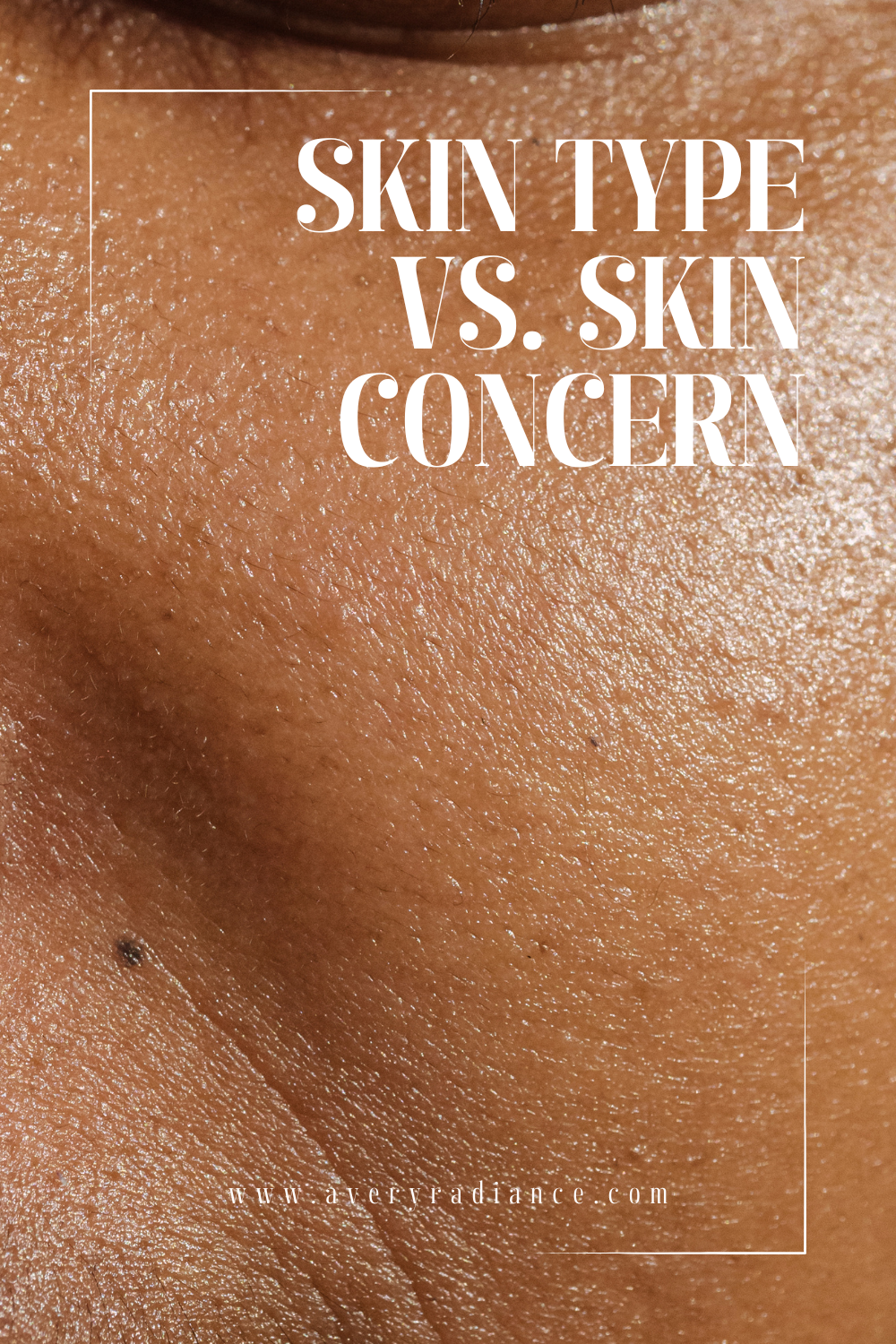Navigating the world of skincare can be confusing, especially when terms like "skin type" and "skin concern" are thrown around. Understanding the difference between these two concepts is key to achieving a clearer, healthier complexion. Let’s break down what each term means, how to identify your skin type and concerns, and why focusing on both can help you say goodbye to wasted products and hello to the skin you’ve always wanted.
So ... What is Skin Type?
Your skin type is determined by your genetics and is usually categorized into four main types:
1. Normal: Balanced skin with minimal imperfections.
2. Oil Skin that produces excess sebum, leading to a shiny appearance and potential for acne.
3. Dry: Skin that lacks moisture, often feeling tight and flaky.
4. Combination: A mix of oily and dry areas, typically with an oily T-zone (forehead, nose, and chin) and dry cheeks.
Okay, now ... What is a Skin Concern?
Skin concerns are issues that can arise due to various factors such as lifestyle, environment, and skincare habits. They can affect any skin type and include:
1. Acne: Pimples, blackheads, and whiteheads caused by clogged pores and bacteria.
2. Hyperpigmentation: Dark spots or patches caused by sun damage, inflammation, or hormonal changes.
3. Aging: Fine lines, wrinkles, and loss of elasticity due to aging and environmental factors.
4. Sensitivity: Redness, irritation, and inflammation triggered by certain products or environmental conditions.
Determining Your Skin Type
Understanding your skin type is the first step to tailoring a skincare routine that works for you. Here’s how you can determine your skin type:
1. Cleanse and Wait: Start by washing your face with a gentle cleanser and patting it dry. Wait for about an hour without applying any products.
2. Observe: After an hour, check your skin’s condition:
- Normal: Feels balanced, not too oily or dry.
- Oily: Looks shiny, especially in the T-zone.
- Dry: Feels tight or rough, with possible flaky areas.
- Combination: Oily in the T-zone but dry in other areas.
Identifying Your Skin Concerns
Skin concerns can vary widely and might change over time. Here’s how to identify and address them:
1. Examine Your Skin: Take a close look at your skin and note any issues like redness, dark spots, or fine lines.
2. Consider Your History: Think about how your skin reacts to different products and environmental factors.
3. Consult a Professional: A dermatologist or skincare expert can provide a more detailed analysis and recommend treatments.
Focusing on Skin Type and Skin Concern
To achieve your skincare goals, it’s crucial to address both your skin type and concerns:
For Normal Skin
- Concerns: Maintenance and prevention.
- Routine: Gentle cleanser, moisturizer, and sunscreen. Add serums for specific concerns like anti-aging or brightening.
For Oily Skin
- Concerns: Acne and shine control.
- Routine: Foaming cleanser, lightweight moisturizer, and non-comedogenic sunscreen. Use salicylic acid or benzoyl peroxide for acne.
For Dry Skin
- Concerns: Hydration and flakiness.
- Routine: Hydrating cleanser, rich moisturizer, and sunscreen. Incorporate hyaluronic acid and ceramides.
For Combination Skin
- Concerns: Balancing different areas.
- Routine: Gentle cleanser, balancing toner, lightweight moisturizer for the T-zone, and richer cream for dry areas. Use spot treatments for specific issues.
Common Skin Concerns
- Acne: Look for ingredients like salicylic acid, benzoyl peroxide, and niacinamide.
- Hyperpigmentation: Vitamin C, alpha arbutin, and retinoids can help lighten dark spots.
- Aging: Retinoids, peptides, and antioxidants can reduce fine lines and wrinkles.
- Sensitivity: Stick to fragrance-free, hypoallergenic products with soothing ingredients like aloe vera and chamomile.
Say Goodbye to Wasted Products and Hello to Clearer Skin
By understanding your skin type and concerns, you can streamline your skincare routine and avoid products that don’t work for you. This not only saves you money but also helps you achieve a clearer, healthier complexion faster.
A Few Tips for an Effective Skincare Routine
- Simplify: Start with the basics (cleanser, moisturizer, sunscreen) and add products as needed.
- Patch Test: Always test new products on a small area to avoid negative reactions.
- Be Consistent: Stick to your routine for about 30 days to give products time to work.
Understanding the difference between skin type and skin concern is crucial for building an effective skincare routine. By addressing both, you can tackle your unique skin issues more effectively and achieve a glowing complexion. At Avery Radiance, we’re here to support you with cruelty-free, vegan skincare products tailored to your needs. Explore our range and find the perfect solutions for your skin type and concerns.
Say goodbye to wasted products and hello to clearer, healthier skin!
Skin Type vs Skin Concern: Understanding the Difference for Clearer Skin


0 comments